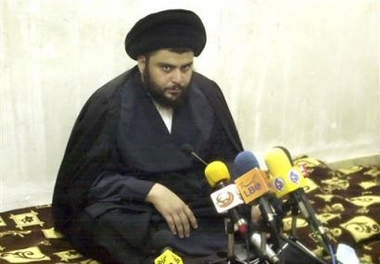Entered into the database on Wednesday, May 18th, 2005 @ 18:16:32 MST
NAJAF, Iraq - Anti-U.S. cleric Muqtada al-Sadr came out of hiding Monday for
the first time since his fighters clashed with American forces in August, delivering
a fiery speech demanding that coalition forces leave Iraq and that Saddam Hussein
be punished. Al-Sadr, the radical Shiite cleric whose militia battled U.S. forces in Baghdad
and Najaf last year, held a press conference in his father's home in this holy
Shiite Muslim city, 100 miles south of Baghdad. Al-Sadr criticized the American-led
occupation and called for an immediate withdrawal of U.S. forces from Iraq.
He also demanded punishment for Saddam, who brutally suppressed Shiites during
his three-decade rule and now is being held in a U.S. military detention facility
in Baghdad awaiting trial on war crimes charges. "I demand several things, including punishing Saddam and calling on the
Iraqi government, religious movements and political factions to work hard to
kick out the occupier," al-Sadr said. "I want the immediate withdrawal
of the occupation forces." Al-Sadr's reappearance coincides with mediation efforts involving Deputy Prime
Minister Ahmad Chalabi to get murder charges against the cleric dropped. An
Iraqi judge has issued an arrest warrant charging al-Sadr and his key lieutenant,
Riyadh al-Nouri, in the 2003 assassination of moderate cleric Abdul Majid al-Khoei. Al-Sadr also accused the United States of trying to foment a sectarian conflict,
and he demanded the coalition release all detainees. "The occupier is trying to make up a sectarian war between the Sunnis
and Shiites," al-Sadr said. "It is not acceptable to direct the allegations
of ugly acts committed by the occupier against the Shiites, to the Sunnis, we
also condemn and denounce all the terrorist acts." He did not elaborate but apparently was referring to a spate of violence since
the April 28 announcement of Iraq's new, Shiite-dominated government. More than
450 people have been killed in insurgent-related activity that has raised fears
of an outbreak of a wider sectarian conflict. The burly, bearded cleric, usually clad in a robe and turban, wields wide support
among young Shiites, particularly in Baghdad's impoverished Sadr City, the scene
of fierce fighting last year between his militia, the Imam al-Mahdi Army and
American forces.